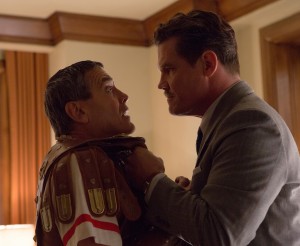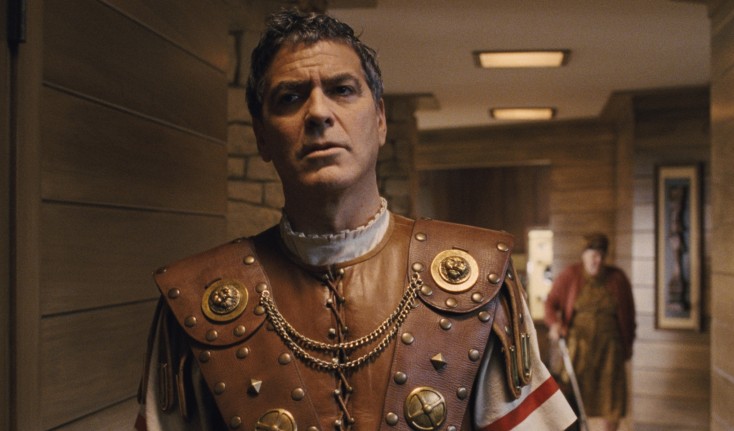
(L to R) Baird Whitlock (GEORGE CLOONEY) is set straight by Eddie Mannix (JOSH BROLIN) in HAIL, CAESAR! ©Universal Studios. CR: Alison Rosa.
By ANGELA DAWSON
Front Row Features
HOLLYWOOD—George Clooney, who starred in Joel and Ethan Coens’ 1930’s-set comedy “O Brother, Where Art Thou?” in 2000, reconnects with the sibling filmmakers, starring in their latest comedy, “Hail, Caesar!” a tongue-in-cheek homage to Hollywood’s Golden Age.
Clooney, 54, plays the chronically unreliable star of a swords-and-sandals epic who goes missing during a break in filming on a (fictitious) studio lot. It turns out Clooney’s Baird Whitlock has been kidnapped, whisked right off the lot and held for $100,000 ransom by a mysterious group with a political agenda at a Malibu beach house. Weary but efficient studio fixer Eddie Mannix (another Coen brothers returning player Josh Brolin) delivers the ransom, while also dealing with a host of other studio headaches, including a pregnant starlet (Scarlett Johansson), a singing cowboy who can’t act (Alden Ehrenreich), a pesky tabloid columnist and her equally annoying sister (both played by Tilda Swinton) fishing for story in a pond that’s stocked with potentially embarrassing peccadilloes.
The Kentucky-born actor/director/activist reveals that he kind of pressured the Oscar-winning Coens (“Fargo,” “No Country for Old Men”) to make the film after mentioning the project publicly for years. Dressed black shirt, jeans and a dark blazer, Clooney also addressed the hot topic of diversity in Hollywood (or the lack thereof) as well as his views on the Academy of Motion Picture Arts and Sciences recent pledge to add more minorities to its membership.
Q: How did you get involved and what was it about this movie that made you want to be a part of it?
Clooney: After “O Brother, Where Are Thou?” (the Coen brothers) pitched me this movie called “Hail, Caesar!” in which one of the characters is an idiot actor—and I wondered why they thought of me—who gets kidnapped by communists. The only line they pitched me was Alden (Ehrenreich’s) line, “This is bad for movie stars everywhere.” That just killed me. But they never wrote the script. Every time I did press, I’d say, “Well, I’m doing a Coen movie next called ‘Hail, Caesar!’ and then Joel and Ethan would call me and say, ‘Stop saying that! We haven’t written it.’ And then they called a couple of years ago and said, ‘Okay, we wrote it, so let’s go do it.’
Q: Josh Brolin plays a movie studio executive who slaps you at one point.
Clooney: I have to say that first, I want it out there that Josh has very, very soft hands. (laughing) They’re like Oscar Wilde, really. So soft. I barely felt it, really. I have no idea why (the Coens wrote that into the script), but they’ve done that with all of our characters. Josh’s character is the smart one, but the rest of us are not particularly the brightest group.
Q: The directors in the film come off really well.
Clooney: They do.
Q: So are the Coen brothers saying in this film that actors should stick to acting?
Clooney: Oh, I don’t know.
Q: Did this fulfill a fantasy of yours to do a sword and sandals epic, in a way?
Clooney: The fantasy was to wear the leather skirt. That was my fantasy. I’ve never really thought of it. When you go back and look at those films, it’s hard not to crack a smile through them when you watch them. They take them very seriously. I really fell in love with them, having watched them for a long period of time, I really fell in love with Victor Mature’s version of all of those kinds of films. His hair was always dyed black and you kind of watch him. He’s been wonderful in films. I’m actually really a huge fan of Victor Mature, but it did feel like he sort of got cinched up into his outfits and went (makes a guttural sound). He’s got that thick Bronx accent through (the film) like Harvey Keitel in “The Last Temptation of Christ.” (in a Bronx accent) “Jesus, Jesus. Look at this Jesus.” And Tony Curtis in “Spartacus.” (with another New York accent) “I’m your fadda.” I just love the idea of this guy going, “Alright, let’s go do another one of these.” I thought it would be a very fun thing to do. But the truth is, I think Jonah (Hill) nailed it. It’s not as much about this particular role. I don’t know an actor who the Coen Brothers would come to and say, “Hey, I’ve got a movie for you to be in, if you want to do it,” that would say no. I mean, that’s the truth.
Q: Are you encouraged or discouraged about the atmosphere in Hollywood right now. Second of all, how much leeway do the Coens give you when you’re doing a show? Do they allow you to go off script and try things or do they pretty much keep it tight?
Clooney: What you’re talking about is the idea of what the Academy’s doing and the diversity. I think it’s a very good idea. I think it’s smart to open up the Academy and make it more diverse. I think it’s long overdue. I also think that’s the very end of a long process that needs to be looked at in terms of which studios, the list of names that the studios will greenlight pictures for, starting with agents, going through writers and directors and everything else. I think that needs to be reexamined for a multitude of reasons and ethnicities. I do believe it’s going to get a very good look at now, which is always good. I think anytime you open up any part of an industry to diversity like that, I’ve never seen it not be good. So I think it’s a good thing.
I think they’re going to answer about working with the Coens and did they change things up.
Q: I’m wondering, you get the script from the Coen brothers. You said yes. You show up on set. What’s it like? You’re all doing these genre movies? Was it anything like you imagined?
Clooney: There are a couple of things that they do that are really unique. They’ve got this guy named J. Todd Anderson, who does all of their storyboards and draws them like cartoons, as opposed to (typical) storyboards, which are usually a very technical thing. I’ve actually used him as an actor in a couple of movies, J. Todd. He’s a wild character. So every morning when you come to the set you get your sides, which is your lines your going to read, and the crew gets it, and on the back you also get all of the storyboards with these sort of things drawn up. The funniest thing is, and I’ve used this as a director since then because it’s so effective, it sort of tells you how they want you to act. It has facial expressions and things, and it also takes away that element as a director for them where they have to sort of negotiate where they want you to go because you see it on the (storyboard) and go, “I’ll go over there and I’ll make this kind of face.” So funnily enough, they have it so mapped out by the time you get there that you’re really just trying to fit into what they see, I think.
Q: Are they always in agreement?
Clooney: You try to get them into fights. Joel will come over with the direction and go, “That is so much better than what Ethan just said.” But the result is nothing.
Q: Watching the Coens have their old Hollywood moment, how was it watching them put those scenes together and what did you think about how perfectly they matched?
Clooney: Almost every film they do has some (homage to classic Hollywood movie). “O Brother, Where Art Thou?” has a line from “Sullivan’s Travels.” The prison break thing and things like that. And then they’d take things from “Wizard of Oz” that they did with Ku Klux Klan members instead (of the Munchkins). So they were always referencing films. That’s what’s really fun about this film, in particular, is this is one where they just said, “Okay, let’s put ’em all in. Busby Berkeley numbers.”





